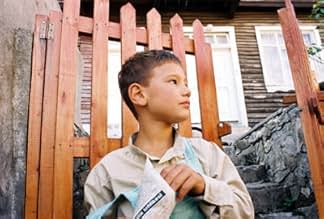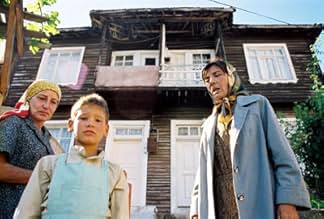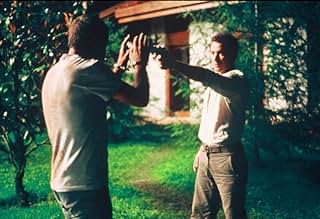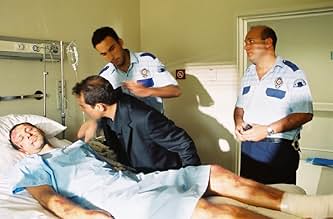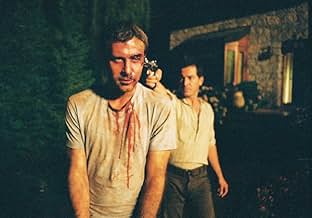Mustafa Hakkinda Hersey
- 2004
- 1h 59min
VALUTAZIONE IMDb
7,5/10
9994
LA TUA VALUTAZIONE
Aggiungi una trama nella tua linguaA Turkish thriller about a man forced to confront his past after he loses everything in an accident.A Turkish thriller about a man forced to confront his past after he loses everything in an accident.A Turkish thriller about a man forced to confront his past after he loses everything in an accident.
- Regia
- Sceneggiatura
- Star
- Premi
- 5 vittorie e 8 candidature totali
Arda Seçgün
- Kerem
- (as Arda Secgun)
Recensioni in evidenza
A perfect movie. After watching "old boy" i thought a revenge movie could not be better than this movie. But i am so happy to have change of watching "Mustafa Hakkinde Hersey." One important point of this movie is Fikret Kuskan. i show respect him. For the last few years he shows his quality. i think he will have an Oscar for the next ten years. Mor ve Otesi, A rock group from Turkiye. They also fit the movie completely. Sometimes revenge is a meeting with your past. Reasons of many problems are hidden in our past. And as tagline Actually, nothing is what it seems. After seeing this film you need some time to think mustafa and your-self. A life without any lies. Could this be possible?
Cagan Irmak's second feature-length movie "Mustafa Hakkinda Her Sey" is my favourite from his self-written and self-directed filmography. It's a Crime/Psycho, one of the few samples of this genre. The other most known Crime/Psycho movies are "Taxi Driver(1976)" ,"Natural Born Killers(1994)" ,"American Psycho(2000)" and so on. Each of those films have their own distinguishing features and Mustafa Hakkinda Her Sey has references with them. Cagan Irmak has successfully blended these features into his storyboard.
Starting with the opening scene, where Mustafa appears alone in his car at a night time running amok, we're receiving a conceptual warning to watch him very carefully within an Expressionist cinema language. In order to explain the reasons of his depression accordingly the story takes us to a warm family bliss evening, in which Mustafa is the father. We stay there with the family whole evening, witnessing to an ordinary family portrait but to rich character introductions. The next morning while Mustafa is at work, his only son in school, his wife has a deadly road accident. So the plot begins to develop very quickly. Mustafa runs to the hospital to get two shocking news one after another leading him into a manic depressive psychosis. He begins to rake up his past thinking his wife cheated on him, then his childhood traumas floods back. After his wife's funeral, he kidnaps her date when he's discharged from hospital.
The two leading actors Fikret Kuskan and Nejat Isler, performed their roles very well; especially at the scenes where they acted together. A little issue with Irmak's directing that supporting actors and even walker-ons couldn't square with the depressive mood of the movie. Nejat Isler plays a taxi driver, cross-referencing Robert De Niro in Scorsese's Taxi Driver(1976) with similarities to Travis Bickle character in his world-view and behavior patterns. Fikret Kuskan's character Mustafa portrays Patrick Bateman from American Psycho(2000) way too much better than Christian Bale did. I've read some audience reviews where people think that Mustafa character is unreal. I strongly advise them to search for "American Psycho" and Bret Easton Ellis to realize how ordinary people become psychopathic criminals. Additionally in subplots, the torture scenes were Tarantino style and they resemble Natural Born Killers a lot.
Technical aspects of this film is below average. Irmak is good at catching the best camera angles. Sounds and visuals are good enough to keep the tension through the whole movie. Mor ve Otesi did a noteworthy job in score and soundtracks.
With this film, Irmak presents an important message for whoever has past regrets in painful memories. At the end, his note showed that he dedicates this film in the memory of his father. In the leading role Mustafa experienced that he has done some faults which were at the point of no return. Regrets can kill, they slowly eat away the soul of someone who has done something wrong and they lead eventually to self-destruction. Mustafa refused to die like that. He had irreparable faults in his past. Soon he found out that the past is the way you want to remember it.
Starting with the opening scene, where Mustafa appears alone in his car at a night time running amok, we're receiving a conceptual warning to watch him very carefully within an Expressionist cinema language. In order to explain the reasons of his depression accordingly the story takes us to a warm family bliss evening, in which Mustafa is the father. We stay there with the family whole evening, witnessing to an ordinary family portrait but to rich character introductions. The next morning while Mustafa is at work, his only son in school, his wife has a deadly road accident. So the plot begins to develop very quickly. Mustafa runs to the hospital to get two shocking news one after another leading him into a manic depressive psychosis. He begins to rake up his past thinking his wife cheated on him, then his childhood traumas floods back. After his wife's funeral, he kidnaps her date when he's discharged from hospital.
The two leading actors Fikret Kuskan and Nejat Isler, performed their roles very well; especially at the scenes where they acted together. A little issue with Irmak's directing that supporting actors and even walker-ons couldn't square with the depressive mood of the movie. Nejat Isler plays a taxi driver, cross-referencing Robert De Niro in Scorsese's Taxi Driver(1976) with similarities to Travis Bickle character in his world-view and behavior patterns. Fikret Kuskan's character Mustafa portrays Patrick Bateman from American Psycho(2000) way too much better than Christian Bale did. I've read some audience reviews where people think that Mustafa character is unreal. I strongly advise them to search for "American Psycho" and Bret Easton Ellis to realize how ordinary people become psychopathic criminals. Additionally in subplots, the torture scenes were Tarantino style and they resemble Natural Born Killers a lot.
Technical aspects of this film is below average. Irmak is good at catching the best camera angles. Sounds and visuals are good enough to keep the tension through the whole movie. Mor ve Otesi did a noteworthy job in score and soundtracks.
With this film, Irmak presents an important message for whoever has past regrets in painful memories. At the end, his note showed that he dedicates this film in the memory of his father. In the leading role Mustafa experienced that he has done some faults which were at the point of no return. Regrets can kill, they slowly eat away the soul of someone who has done something wrong and they lead eventually to self-destruction. Mustafa refused to die like that. He had irreparable faults in his past. Soon he found out that the past is the way you want to remember it.
"Mustafa hakkinda hersey" is the best Turkish movie i've seen this year so far. Its interesting story is being told very excitingly, and Fikret Kuskan who plays the betrayed husband called Mustafa, delivers a masterpiece of work.
Director Cagan Irmak is telling the story bi-linear, since you're always changing sides between the betrayed and betrayer while watching. I really can recommend this Drama to everyone, who wants to find out his own feelings between anger and sadness.
There are also 1 or two things that maybe should have been told more precise, for instance like Mustafa's childhood. Also the final dialog could have been better, since it is one of the most important parts of Mustafa's story. But it is not screwing up things.
Bravo to everyone who worked on that film.
Director Cagan Irmak is telling the story bi-linear, since you're always changing sides between the betrayed and betrayer while watching. I really can recommend this Drama to everyone, who wants to find out his own feelings between anger and sadness.
There are also 1 or two things that maybe should have been told more precise, for instance like Mustafa's childhood. Also the final dialog could have been better, since it is one of the most important parts of Mustafa's story. But it is not screwing up things.
Bravo to everyone who worked on that film.
Nice attempt to improve the Turkish Movie Industry but its plot is not an original idea. The performances of the players are praiseworthy, but it seems to me that it has some inefficiencies in screenplay. Especially, after the kidnapping of Fikret, the dialogs between him and Mustafa are sometimes very hilarious. I mean this is a high tension movie (at least it is expected to be) and those ridiculous speeches cause me to lose my attention and desire to the kidnapping incident. Fikret Kuskan and Nejat Isler were so successful, and even her small part Basak Koklukaya was awesome.. Despite of all above negative points, I think it is worth to watch this movie; 6.5/10
Sometimes it's wise to set aside one's prejudices against a film and consider it on its own merits as a contribution to the knowledge of the society that produces it.
Such is the case with MUSTAFA HAKKINDA HERŞEY (ALL ABOUT MUSTAFA). A Gothic melodrama reveling in its extremities, Çağan Irmak's film in my opinion piles absurdity on absurdity culminating in a sentimental denouement. But perhaps I am looking at it through jaundiced eyes.
The plot is straightforward: Mustafa (Fikret Kuşkan) is a successful businessman with a wife (Başak Köklükkaya) and son (Arda Seçgün) who runs his own film and advertising business. Life seems fairly good to him, although he does seem a little extreme in his reactions, especially during meetings. His wife Ceren dies unexpectedly in a car accident, that sends Mustafa into paroxysms of grief. Later on he discovers that she had had an affair with taxi-driver Fikret (Nejat İsler), so Mustafa determines to wreak revenge by imprisoning Fikret in a lonely house and forcibly extracting the truth from him. As time passes, we learn that Mostafa has had a highly troubled childhood, which explains why he reacts so excessively to the news of his wife's death.
The film is full of lurid sequences using tilted cameras and vivid colors to denote Mustafa's tortured state of mind. While alone with Fikret, he subjects the unfortunate taxi-driver to extreme forms of punishment, often involving S&M, which makes us feel that there is a sexual dimension to his sadism. The film includes tropes familiar from other Çağan Irmak films - the isolated house recalls KAÇAN FIRSATLAR LİMİTED; the sculptures adumbrate TAMAM MİYİZ?, and the sadism recalls KARANLIK TAKİLER. Throughout we are led to believe that Mustafa's behavior can be attributed to his childhood, especially his relationship to his father (who was equally sadistic).
At the same time he is portrayed as a family man with a touching concern for Kerem. This suggests some kind of cathartic desire; once he has exorcised the devil of childhood from his consciousness, he can be somehow released from mental torment. The diabolic aspects of the film are well brought out through the use of fast cutting.
The film does not tell us much about contemporary Turkish society; rather it suggests that human beings have to find their own means of coping with existence. Sometimes they cannot do this, and hence descend into abnormality.
Such is the case with MUSTAFA HAKKINDA HERŞEY (ALL ABOUT MUSTAFA). A Gothic melodrama reveling in its extremities, Çağan Irmak's film in my opinion piles absurdity on absurdity culminating in a sentimental denouement. But perhaps I am looking at it through jaundiced eyes.
The plot is straightforward: Mustafa (Fikret Kuşkan) is a successful businessman with a wife (Başak Köklükkaya) and son (Arda Seçgün) who runs his own film and advertising business. Life seems fairly good to him, although he does seem a little extreme in his reactions, especially during meetings. His wife Ceren dies unexpectedly in a car accident, that sends Mustafa into paroxysms of grief. Later on he discovers that she had had an affair with taxi-driver Fikret (Nejat İsler), so Mustafa determines to wreak revenge by imprisoning Fikret in a lonely house and forcibly extracting the truth from him. As time passes, we learn that Mostafa has had a highly troubled childhood, which explains why he reacts so excessively to the news of his wife's death.
The film is full of lurid sequences using tilted cameras and vivid colors to denote Mustafa's tortured state of mind. While alone with Fikret, he subjects the unfortunate taxi-driver to extreme forms of punishment, often involving S&M, which makes us feel that there is a sexual dimension to his sadism. The film includes tropes familiar from other Çağan Irmak films - the isolated house recalls KAÇAN FIRSATLAR LİMİTED; the sculptures adumbrate TAMAM MİYİZ?, and the sadism recalls KARANLIK TAKİLER. Throughout we are led to believe that Mustafa's behavior can be attributed to his childhood, especially his relationship to his father (who was equally sadistic).
At the same time he is portrayed as a family man with a touching concern for Kerem. This suggests some kind of cathartic desire; once he has exorcised the devil of childhood from his consciousness, he can be somehow released from mental torment. The diabolic aspects of the film are well brought out through the use of fast cutting.
The film does not tell us much about contemporary Turkish society; rather it suggests that human beings have to find their own means of coping with existence. Sometimes they cannot do this, and hence descend into abnormality.
Lo sapevi?
I più visti
Accedi per valutare e creare un elenco di titoli salvati per ottenere consigli personalizzati
- How long is Everything About Mustafa?Powered by Alexa
Dettagli
- Data di uscita
- Paese di origine
- Sito ufficiale
- Lingua
- Celebre anche come
- Everything About Mustafa
- Luoghi delle riprese
- Aziende produttrici
- Vedi altri crediti dell’azienda su IMDbPro
Botteghino
- Lordo in tutto il mondo
- 261.085 USD
- Tempo di esecuzione1 ora 59 minuti
- Colore
Contribuisci a questa pagina
Suggerisci una modifica o aggiungi i contenuti mancanti

Divario superiore
By what name was Mustafa Hakkinda Hersey (2004) officially released in Canada in English?
Rispondi
